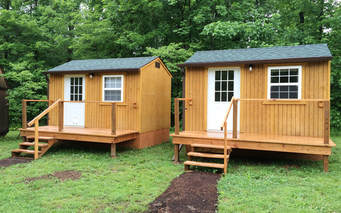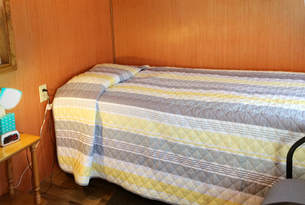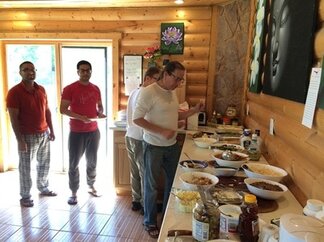Dhamma Sukha Meditation Center, May–October 2024
Individual residential metta (loving-kindness) meditation retreats are available from April to October. Participants are instructed and guided in the practice of TWIM (Tranquil Insight Wisdom Meditation). TWIM practice was originally taught at the center by Venerable Bhante Vimalaramsi. This is the earliest know form of Vipassana (insight) combined with Samatha (tranquility) as described in the Buddhist Pali texts.
Individual residential metta (loving-kindness) meditation retreats are available from April to October. Participants are instructed and guided in the practice of TWIM (Tranquil Insight Wisdom Meditation). TWIM practice was originally taught at the center by Venerable Bhante Vimalaramsi. This is the earliest know form of Vipassana (insight) combined with Samatha (tranquility) as described in the Buddhist Pali texts.
|
Dhamma Sukha Meditation Center mission is to preserve and teach original Buddhist teachings and meditation as found in the earliest Buddhist texts to ease suffering and promote peace in this world. The center is located near Ironton Missouri in the Ozark mountains about two hours south of St. Louis. Missouri.
TWIM is ideal for beginning students who who wish to learn a mediation suitable for active lifestyles or advanced meditators seeking to cultivate wisdom and contentment.
Retreats are small and conducted largely in silence however, mindful speech is encouraged during the evening Dhamma talks. Participants are requested to observe eight precepts that comprise a code of conduct as a foundation for meditation practice. |
The daily schedule includes a morning group practice session with a short reading of the Buddhist refuges and precepts followed by seated and walking meditation. Meditation practice is individually directed by each teacher in one-on-one daily interviews. Instruction and guidance is based each persons abilities to progress smoothy to advance in the stages of meditation.
 Dhamma_Sukha_Meditation_Dining_Hall
Dhamma_Sukha_Meditation_Dining_Hall
Residential Meditation Courses
Participants are required to be present and seated in the meditation hall for the 6:00 AM and 6:00 PM sessions. A daily one-on one teacher interview is scheduled scheduled for each person.
During practice periods, participants balance sitting and walking meditation as suggested by the teacher Indoor and outdoor meditation practice is encouraged throughout the retreat.
DAILY SCHEDULE:
5:30 am Wake up
6:00 am Group Sitting practice
7:00 am Breakfast
7:45 am Work period
8:45 am Sitting and walking practice
11:00 am Lunch
12:30 pm Rest
1:30 pm Interviews and practice
5:30 pm Tea time
6:00 pm Dhamma talk and discussion
8:00 pm Sitting and walking practice
10:00 pm Bedtime
Participants are required to be present and seated in the meditation hall for the 6:00 AM and 6:00 PM sessions. A daily one-on one teacher interview is scheduled scheduled for each person.
During practice periods, participants balance sitting and walking meditation as suggested by the teacher Indoor and outdoor meditation practice is encouraged throughout the retreat.
DAILY SCHEDULE:
5:30 am Wake up
6:00 am Group Sitting practice
7:00 am Breakfast
7:45 am Work period
8:45 am Sitting and walking practice
11:00 am Lunch
12:30 pm Rest
1:30 pm Interviews and practice
5:30 pm Tea time
6:00 pm Dhamma talk and discussion
8:00 pm Sitting and walking practice
10:00 pm Bedtime
Zoom and Online Retreats
Zoom Retreats with are led by David Johnson in the late Fall, Winter, and earlySpring months. This format requires a minimum of six hours daily of seated meditation each day along with intermittent walking meditation. Eight precepts are suggested to enhance the meditative practice with daily video instruction. Daily scheduled one-on-one private interviews provide detailed instruction to enhance progress.
|
"I eventually found my mind becoming more relaxed and had some phenomenal sittings towards the end of the retreat"
|
Cleona Lara shares her experience of attending several online meditation course. She offer tips about including the challenges and rewards.
Cleona discusses the importance of daily coaching by the teacher to provide essential guidance and direction. She emphasizes how to deal with habitual distractions and committing to wholesome states of mind. Cleona's Meditation Tips:
|
Teachers
he 2024 teachers include; Antra Berger, David Johnson, Ven. Dr. Saccananda, Ven. Bhante Kusala, and other TWIM teachers. These teachers have extensive experience leading retreats, providing daily one-on-one personal interviews to optimize progress in the stages of meditation. Other teachers have dedicated personal practice and completed long mentorship with Bhante Vimalaramsi who certified each of them to teach TWIM in Europe and Asia. More listings HERE
he 2024 teachers include; Antra Berger, David Johnson, Ven. Dr. Saccananda, Ven. Bhante Kusala, and other TWIM teachers. These teachers have extensive experience leading retreats, providing daily one-on-one personal interviews to optimize progress in the stages of meditation. Other teachers have dedicated personal practice and completed long mentorship with Bhante Vimalaramsi who certified each of them to teach TWIM in Europe and Asia. More listings HERE
Accommodations
Single room accommodation are simple but conformable. Couples may not co-habitate even if married. Participants share a modern community bathroom facilities and a central dining hall. The main buildings are ready to access and offer central heating and air conditioning. Single or double occupancy bedrooms are available on a first-serve basis.
Meals and Dining
|
Breakfast and lunch are the two meals offered buffet style each day. Rrefrigerated food storage is available to those with special dietary needs. Contact the retreat manager if you have a medical need to bring supplemental foods for your private consumption. Tea and fruit juices will be available everyday around 5:30 PM before each evening Dhamma talk.
|
Registration and Fees
|
After you register, the retreat manager will contact you to arrange arrival and departure itinerary and ground transportation. First complete and submit the Contact Form.
|
All fees include meals and specific accommodations on a first come basis. See the Dhamma Sukha website for specific details at:
Most Americans are not familiar with traditional and appropriate conduct when interacting with Buddhist monks or nuns. The downloadable PDF below is a brief summary that you many find helpful in guiding your interactions.
| etiquette_with_monks_and_nuns-2.pdf | |
| File Size: | 49 kb |
| File Type: | |
What to Wear
Temperatures and weather in Missouri can be unpredictable. Check Here for the local forecast and prepare accordingly.
Bring comfortable but modest loose fitting clothes that facilitate sitting and walking meditation. Sweat pants and easy slip-on/off shoes are recommended. Bring clothing that can be layered should the weather turn unexpectedly warm or colder than normal. It is advisable to bring a knit cap and gloves just in case the weather turn cold. Sweaters or jackets are generally needed at night.
Shoes are not permitted in the building. Socks or soft slippers are appropriate in the meditation hall. Shawls and body blankets are recommended for sitting and walking meditation.
What to Bring
Chairs and cushions
(zafu) with mats (zabuton) will be provided by the Center. You are welcome to bring any kind of meditation bench, pillows or mat that will make your meditation experience comfortable.
Other Necessities to Bring:
Bed linens, blankets, and towels are provided. Bring a special personal pillow or blanket if desired. Bring personal toiletries (toothpaste, bath soap, sunscreen, Kleenex, etc), insect repellant, flashlight or headlamp and extra batteries, an alarm clock or watch with an alarm, and a water bottle to be filled at the center with filtered water as needed.
What to Leave at Home:
Do not bring valuables, nonprescription drugs or alcohol. Avoid using scented cosmetics or perfumes that may be allergenic to others. Reading and writing are discouraged during this training period, except during the evening dhamma talks by Bhante. Candles, incense, and smoking are not allowed in any rooms.
Clocks and Phones:
Please be punctual for all group events. Turn sound off clocks and watches. There is no public phone on the facility. Cell phones will be collected at the beginning of the retreat and made available during breakfast on the closing day of the retreat. Computers and notebooks are prohibited during the retreat. Safe and secure storage for personal computers and cell phones will be provided.
Temperatures and weather in Missouri can be unpredictable. Check Here for the local forecast and prepare accordingly.
Bring comfortable but modest loose fitting clothes that facilitate sitting and walking meditation. Sweat pants and easy slip-on/off shoes are recommended. Bring clothing that can be layered should the weather turn unexpectedly warm or colder than normal. It is advisable to bring a knit cap and gloves just in case the weather turn cold. Sweaters or jackets are generally needed at night.
Shoes are not permitted in the building. Socks or soft slippers are appropriate in the meditation hall. Shawls and body blankets are recommended for sitting and walking meditation.
What to Bring
Chairs and cushions
(zafu) with mats (zabuton) will be provided by the Center. You are welcome to bring any kind of meditation bench, pillows or mat that will make your meditation experience comfortable.
Other Necessities to Bring:
Bed linens, blankets, and towels are provided. Bring a special personal pillow or blanket if desired. Bring personal toiletries (toothpaste, bath soap, sunscreen, Kleenex, etc), insect repellant, flashlight or headlamp and extra batteries, an alarm clock or watch with an alarm, and a water bottle to be filled at the center with filtered water as needed.
What to Leave at Home:
Do not bring valuables, nonprescription drugs or alcohol. Avoid using scented cosmetics or perfumes that may be allergenic to others. Reading and writing are discouraged during this training period, except during the evening dhamma talks by Bhante. Candles, incense, and smoking are not allowed in any rooms.
Clocks and Phones:
Please be punctual for all group events. Turn sound off clocks and watches. There is no public phone on the facility. Cell phones will be collected at the beginning of the retreat and made available during breakfast on the closing day of the retreat. Computers and notebooks are prohibited during the retreat. Safe and secure storage for personal computers and cell phones will be provided.
Simplicity
Meditation retreats offer a sacred space that is protected and removed from the world. They allow participants a rare opportunity to look deeply inside, quiet the mind, and open the heart. Often the most beneficial and rewarding experiences of spiritual life happen at a meditation retreat. The sheltered and quiet setting is a key element that enables participants to develop patience, steadfastness, lovingkindness, generosity, joy, and wisdom. These are the seeds that grow insight, compassion, and contentment.
Participants are requested to let go of concerns for daily life and embrace an attitude of simplicity and renunciation by adopting a traditional spiritual practice that is called “taking what is offered”.
1. Taking Any Residence – whatever quarters are offered. We ask participants to happily accept the accommodation assigned and continue to practice in this spirit throughout course of the retreat.
2. Taking food that is offered – Happily accepting food that is offered is part of the practice.The cook lovingly prepares tasty and nutritious vegetarian meals. Alternative dishes will be available for those with medically required dietary restrictions. Participants with special dietary needs are encouraged to bring ready-to-eat supplemental food items that may be kept in the central refrigerator located in the dining room. Hot water and a microwave oven are available 24/7. Food items are prohibited in rooms and the meditation hall. Food preparation is not allowed in the kitchen or dining area.
3. Silence – In fostering an atmosphere of contemplation and meditation, retreatants are requested to embrace the practice of Noble Silence during the retreat. Living in silence is the practice of observing within and not communicating with others. This includes reading or writing, using telephones, computer, email or text messages. Talking is permitted during the evening dhamma talks and teacher interviews when questions are encouraged. Inquiries about the retreat may be directed to a retreat manager or whenever necessary in the case of an emergency.
4. Serving the Community – Retreatants may wish to volunteer for community work as a dailyperiod of meditation in action. This activity acquaints yogis with meditation practice in daily activities and helps the retreat function more smoothly. A sign-up sheet for yogi jobs will be available during registration.
The retreat is organized and managed by volunteers as a community service. Bhante Vimalaramsi freely gives the teachings and his time to be of service to the Buddha, the Dhamma (the teachings), and the Sangha (the community).
We deeply value the benefits of these profound spiritual practices and are honored to share these blessings with you. Thank you for your participation.
Participants are requested to let go of concerns for daily life and embrace an attitude of simplicity and renunciation by adopting a traditional spiritual practice that is called “taking what is offered”.
1. Taking Any Residence – whatever quarters are offered. We ask participants to happily accept the accommodation assigned and continue to practice in this spirit throughout course of the retreat.
2. Taking food that is offered – Happily accepting food that is offered is part of the practice.The cook lovingly prepares tasty and nutritious vegetarian meals. Alternative dishes will be available for those with medically required dietary restrictions. Participants with special dietary needs are encouraged to bring ready-to-eat supplemental food items that may be kept in the central refrigerator located in the dining room. Hot water and a microwave oven are available 24/7. Food items are prohibited in rooms and the meditation hall. Food preparation is not allowed in the kitchen or dining area.
3. Silence – In fostering an atmosphere of contemplation and meditation, retreatants are requested to embrace the practice of Noble Silence during the retreat. Living in silence is the practice of observing within and not communicating with others. This includes reading or writing, using telephones, computer, email or text messages. Talking is permitted during the evening dhamma talks and teacher interviews when questions are encouraged. Inquiries about the retreat may be directed to a retreat manager or whenever necessary in the case of an emergency.
4. Serving the Community – Retreatants may wish to volunteer for community work as a dailyperiod of meditation in action. This activity acquaints yogis with meditation practice in daily activities and helps the retreat function more smoothly. A sign-up sheet for yogi jobs will be available during registration.
The retreat is organized and managed by volunteers as a community service. Bhante Vimalaramsi freely gives the teachings and his time to be of service to the Buddha, the Dhamma (the teachings), and the Sangha (the community).
We deeply value the benefits of these profound spiritual practices and are honored to share these blessings with you. Thank you for your participation.
©2024 Awaken Insight Retreats and TWIM Foundation Intellectual Property. All rights reserved.



